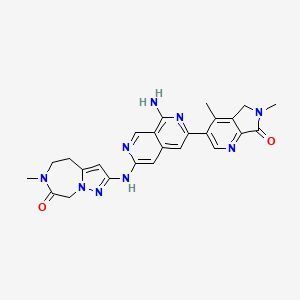Exotoxin A / 100 mg
Safety Information
Hazard Statements
Precautionary Statements
Pictograms
Properties
| Signal Word | Danger |
Product Description
Exotoxin A refers to a category of proteins secreted by bacteria that are toxic to eukaryotic cells. These exotoxins are known for their ability to disrupt cellular functions, leading to cell death. Exotoxin A, in particular, is a potent inhibitor of protein synthesis in mammalian cells, acting by ADP-ribosylation of elongation factor 2 (EF-2). This mechanism inhibits the translation process, preventing the synthesis of essential proteins required for cell survival. Due to its specific mode of action, exotoxin A has been the subject of extensive study for its potential therapeutic applications, particularly in the treatment of bacterial infections resistant to conventional antibiotics.
Application
In practical applications, exotoxin A and similar toxins have been explored for their potential in targeted cancer therapy. By exploiting the toxin's ability to inhibit protein synthesis selectively in rapidly dividing cancer cells, researchers aim to develop treatments that minimize damage to normal cells while effectively killing tumor cells. Additionally, understanding the molecular mechanisms underlying exotoxin A's action provides insights into bacterial pathogenesis, contributing to the development of new antibacterial strategies.
Articles:
- Pseudomonas exotoxin A: From virulence factor to anti-cancer agent
Publication Date: Available online 23 October 2008
Philipp Wolf, Ursula Elsässer-Beile
https://doi.org/10.1016/j.ijmm.2008.08.003
- A guide to taming a toxin – recombinant immunotoxins constructed from Pseudomonas exotoxin A for the treatment of cancer
Publication Date: 17 May 2011
John E. Weldon, Ira Pastan
https://doi.org/10.1111/j.1742-4658.2011.08182.x
- Cloning, nucleotide sequence, and expression in Escherichia coli of the exotoxin A structural gene of Pseudomonas aeruginosa.
Publication Date: May 15, 1984
G L Gray, D H Smith, J S Baldridge, R N Harkins, M L Vasil, E Y Chen, and H L Heyneker
